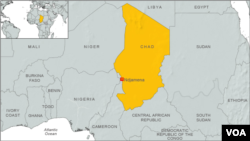Emergency water supplies are being rushed to southeastern Chad where about 50-thousand people have fled fighting in Sudan’s Darfur region. Several Arab tribes have been battling for control of mining operations there.
The refugees and migrants have been gathering around the village of Tissi since January. Felix Leger is the country director for the International Rescue Committee.
“The situation is still of concern, mainly from a humanitarian perspective because, as you know, the influx of displaced people continues. The last data we got from Tissi area shows that you have more than 27,000 refugees from Sudan, but you also have some Chadians that returned from Sudan. The number is a bit above 19,000. You also have some refugees from CAR,” HE SAID.
Before the influx, Tissi was a village with a single borehole for water. Leger says it was barely enough for the residents and quickly became inadequate for the growing population. The International Rescue Committee is now bringing water supplies in by truck from nearby Lake Tissi.
Leger said, “Our intention is to pump the water from the lake – to treat it – and then to deliver through a water system in order to provide clean water to the refugees and the displaced.”
The refugees and migrants are already using the lake for drinking water. The problem is the lake is also being used for bathing and a watering hole for their animals. To make matters worse, the IRC says there are only 10 latrines in the area and people are defecating near the lake. Simply put, it’s not safe to drink without being treated first and there’s the potential for disease.
“Some now are queuing a long time, many hours, in front of the existing network in Tissi. Some have tried to find traditional wells quite far from their place of relocation. So, definitely one of the needs right now is to increase the capacity to provide potable water,” he said.
He said getting water to Tissi is a race against time because the rainy season is expected to begin in two weeks or less. When it does, the roads will become too muddy for the trucks. The IRC is bringing the necessary materials from other parts of Chad so a functioning clean water system can be in place when the rains come.
Doctors Without Borders, also known as MSF, has set-up medical facilities in Tissi. Last month, it reported an outbreak of measles in the nearby area of Saraf Bourgou. The disease has killed a number of young children.
The U.N. refugee agency, UNHCR, is helping to provide shelter. Trees have provided minimal shelter for many families, leaving them exposed to the sun, wind and cold temperatures at night.
The refugees and migrants have been gathering around the village of Tissi since January. Felix Leger is the country director for the International Rescue Committee.
“The situation is still of concern, mainly from a humanitarian perspective because, as you know, the influx of displaced people continues. The last data we got from Tissi area shows that you have more than 27,000 refugees from Sudan, but you also have some Chadians that returned from Sudan. The number is a bit above 19,000. You also have some refugees from CAR,” HE SAID.
Before the influx, Tissi was a village with a single borehole for water. Leger says it was barely enough for the residents and quickly became inadequate for the growing population. The International Rescue Committee is now bringing water supplies in by truck from nearby Lake Tissi.
Leger said, “Our intention is to pump the water from the lake – to treat it – and then to deliver through a water system in order to provide clean water to the refugees and the displaced.”
The refugees and migrants are already using the lake for drinking water. The problem is the lake is also being used for bathing and a watering hole for their animals. To make matters worse, the IRC says there are only 10 latrines in the area and people are defecating near the lake. Simply put, it’s not safe to drink without being treated first and there’s the potential for disease.
“Some now are queuing a long time, many hours, in front of the existing network in Tissi. Some have tried to find traditional wells quite far from their place of relocation. So, definitely one of the needs right now is to increase the capacity to provide potable water,” he said.
He said getting water to Tissi is a race against time because the rainy season is expected to begin in two weeks or less. When it does, the roads will become too muddy for the trucks. The IRC is bringing the necessary materials from other parts of Chad so a functioning clean water system can be in place when the rains come.
Doctors Without Borders, also known as MSF, has set-up medical facilities in Tissi. Last month, it reported an outbreak of measles in the nearby area of Saraf Bourgou. The disease has killed a number of young children.
The U.N. refugee agency, UNHCR, is helping to provide shelter. Trees have provided minimal shelter for many families, leaving them exposed to the sun, wind and cold temperatures at night.





